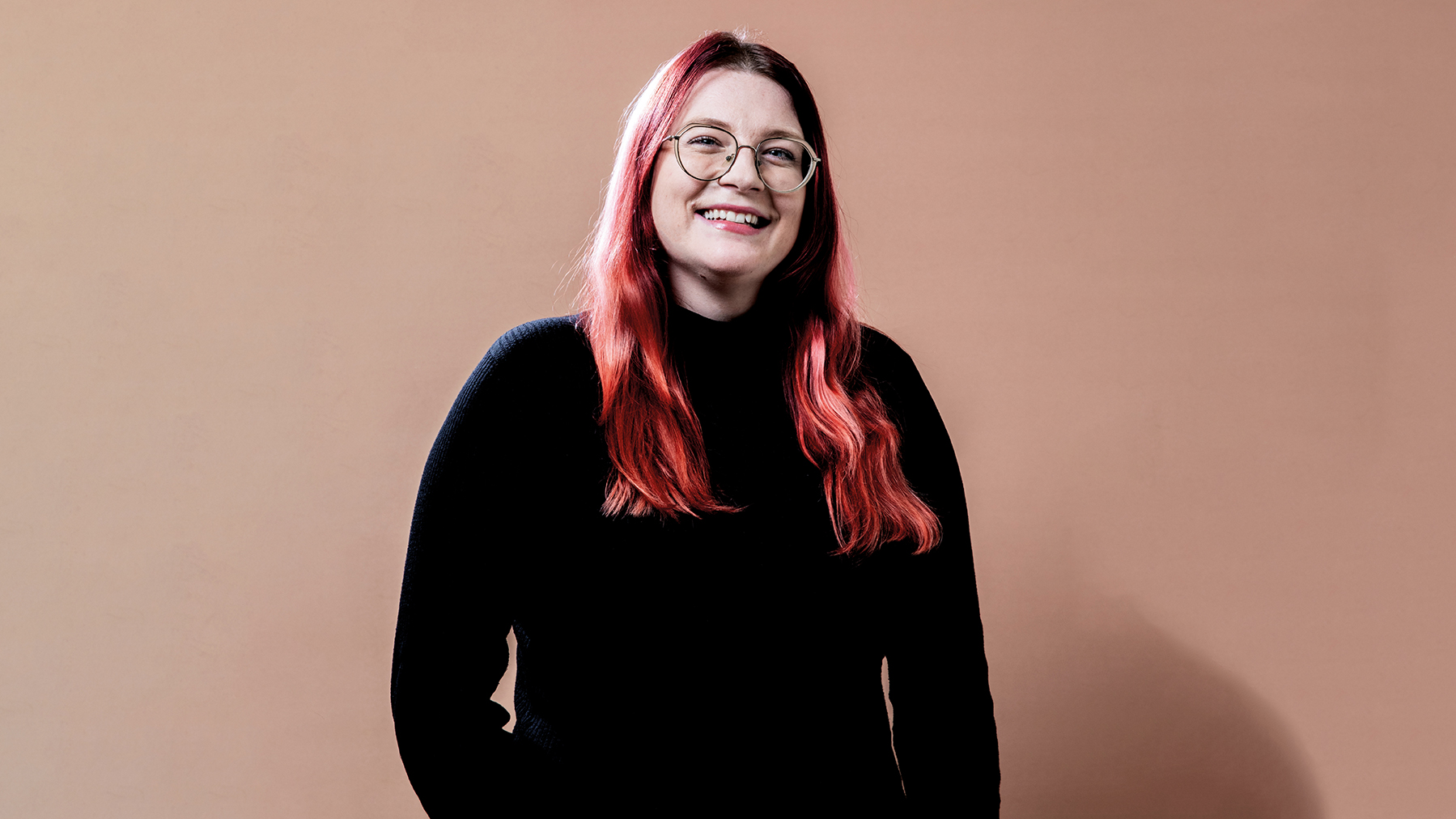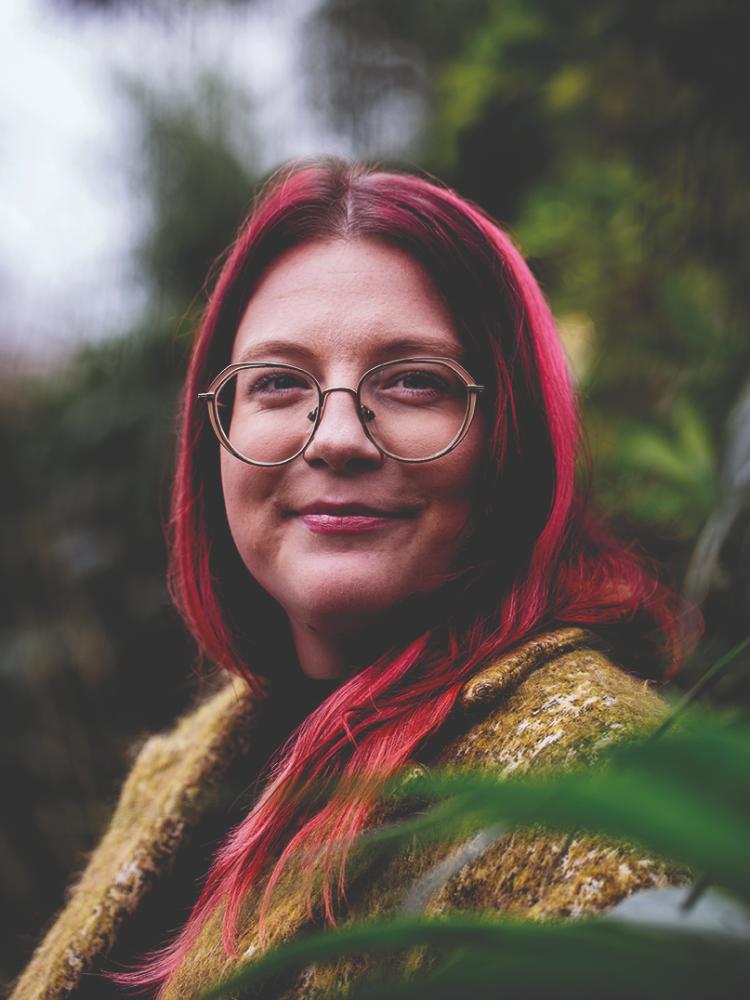Baroness Smith of Llanfaes: 'I don’t believe Westminster will ever work for Wales'
Baroness Smith of Llanfaes (Photography: Louise Haywood-Schiefer)
8 min read
Baroness Smith of Llanfaes tells Sophie Church why she thinks Westminster will never work for Wales, and how politics is changing from being a ‘place for men’. Photography by Louise Haywood-Schiefer
With her shock of pink hair and support for Welsh independence, 28-year-old Carmen Smith, Baroness Smith of Llanfaes, stands out among her colleagues on the red benches. One of just two Plaid Cymru peers, she tells The House why she believes Westminster will never work for Wales.
“I believe in an independent Wales where all decisions about Wales are made in Wales, and I do believe we will get there. I just don’t believe in Westminster in terms of how the system is,” says Smith.
Coal tips, she says, perfectly illustrate how the current political system is able to ignore issues that matter deeply to its communities. The peer notes that as we approach the 60th anniversary of the Aberfan disaster – in which 116 children died when a heap collapsed onto a school – hundreds of tips remain dangerous.
“It was something that people in the Valleys still remember,” says Smith. “Even today, there are 2,500 coal tips in Wales still and 10 per cent of them are at the highest risk. So about 250 of them have risk of falling onto communities or infrastructure.” Days after she spoke about the issue in the Lords, a coal tip collapsed in Cwmtillery.
 Baroness Smith of Llanfaes (Photography: Louise Haywood-Schiefer)
Baroness Smith of Llanfaes (Photography: Louise Haywood-Schiefer)
“It’s quite lucky that’s only just one accident in recent weeks,” she says. “The fundamental issue is that the UK government have always said that it’s not their responsibility, that it’s a devolved matter, and that the Welsh government and local communities in those areas need to pay for the safety of those tips.”
While the government announced £25m towards remediation of coal tips in the recent budget, Smith says around £600m to £800m is actually needed. With the UK reaping the benefits of coal mined in Wales, and coal tips predating devolution, Westminster “needs to recognise that it is responsible” for the remediation costs, she says.
“At the moment, we’re still in the position where there’s a lack of responsibility being taken by the governments,” she says. “Even now where we have two Labour governments – one in Cardiff and one in London – there still isn’t a long-term solution.”
“Since we’ve had devolution, we’ve always had a Labour government in Wales, but we haven’t really been seeing that growth. We’ve existed, we’re continuing going, but there’s no ambition, there’s no doing anything radical,” she adds.
“If we elect a Plaid Cymru government in the next Senedd election, we would see a very different Wales.”
Somewhat surprisingly, Smith says: “I personally wish that I didn’t believe in Welsh independence.” She insists, however: “I just don’t believe that Westminster will ever work for Wales. And I think the best way forward is for Wales to have all decisions about Wales to be made in Wales.” But is there another solution to the problems she describes?
“Look at the evidence,” Smith replies, pointing to the recommendations of the recent Independent Commission on the Constitutional Future of Wales, which stated that independence “is a viable option”. However, she laughs when noting that the report did also say “other options are available”.
Smith insists that independence will bring about the growth Wales deserves. “Wales doesn’t have any fiscal independence, so we can’t borrow, therefore we can’t invest, and then we can’t grow. So we’re constantly having to go with a begging bowl to London. Until we have those fiscal levers, it’s very difficult for Wales to grow.”
To do a job, you have to show up and get work done
Despite Plaid Cymru polling higher than Labour at the time of writing, bringing independence that step closer, the party has struggled with internal battles threatening its development. Last year, a report found a “culture of harassment, bullying and misogyny” within Plaid Cymru, with then-leader Adam Price admitting the report had “harmed and tarnished” the party. Price stepped down as leader soon after.
Does Smith think that enough is being done to combat that culture within the party?
Her first instinct is to blame the “toxic culture” of politics, which “stems from decades of being a place for men”.
However, she recognises it was “a tough time for the party”, adding that Plaid has “come out of it in a better position” and been able to “acknowledge fault when there was fault”. Of the 82 recommendations in the report, Smith says she is “under the understanding that most of those recommendations have been met”.
“I wouldn’t say it’s done and dusted, but I don’t think that that is an attitude that any organisation should have; we should always be open to learning,” she says.
Smith has lived by her word. Born in Salisbury, she moved to Llanfaes in Anglesey at the age of seven. The daughter of a Tata steelworker, she joined Plaid Cymru around the age of 17 and describes herself as a “progressive left socialist”. She credits then-leader Leanne Wood with influencing her view of politics: “I didn’t think politics was a place for women, especially those from working-class backgrounds, until I met her.”
 Baroness Smith of Llanfaes (Photography: Louise Haywood-Schiefer)
Baroness Smith of Llanfaes (Photography: Louise Haywood-Schiefer)
After briefly studying at Bangor University, Smith worked at international development organisation United Purpose, before working in the European parliament as a political researcher. From there, she moved to New York, where she worked for popstar Alicia Keys’ charity Keep a Child Alive.
Smith then returned to Wales to work for Plaid Cymru – rising from an admin manager to chief of staff of the Plaid Cymru Senedd Group. She stood for election twice in 2019 – first for the European parliament, then for the seat of Ynys Môn in Westminster. She was selected to take a place in the Lords via an internal party election process.
Now a peer, Smith feels “even stronger” than she once did about dragging the House of Lords’ archaisms into the modern age. “A lot of it is completely barmy,” she laughs. “From the outset, I didn’t believe in how it’s set out in terms of the processes, but also how it’s an unelected chamber.
“I still feel the same way, and probably actually feel even stronger about it because of learning how everything works.”
While the House of Commons has set up a Modernisation Committee, the Lords goes without. Smith says she is now “looking to speak to the Modernisation Committee in the Commons to understand how they’re being structured”, saying it would “definitely make sense” for an equivalent body in the Lords.
She suggests “easy fixes” would be tweaking scheduling in the Lords – shifting the working day to 9am every day, for instance – to enable those with families to participate more freely. Moving to online voting, she says, would also give peers the time to “actually speak to people that laws affect”.
“I think one of the biggest surprises I’ve had joining the House is the ability to make change in a practical way,” she says.
But with Plaid Cymru peers subject to a reselection process after five years, Smith says her priority will be “long-term reforms”.
The day after our interview, Smith takes part in the hours-long debate discussing the fate of hereditary peers in the House of Lords. “Just getting rid of the 92 hereditaries is being painted as radical in some way. It really isn’t, because it’s something that was promised 25 years ago,” she says exasperatedly.
“It doesn’t seem like a priority that the government has, and I understand why, because keeping the system the same protects the establishment, and the government is the establishment.”
Despite what Smith sees as governmental reluctance for reform, one proposal is gaining cross-party support: requiring peers to attend the Lords for 10 per cent of sitting days, with failure to do so risking expulsion.
Should the requirement be higher than 10 per cent?
“Oh, certainly I think that,” says Smith. “I believe that participation is very important. I see the role I have here as a job, I don’t see it as an honour. And to do a job, you have to show up and get work done.”
 Baroness Smith of Llanfaes (Photography: Louise Haywood-Schiefer)
Baroness Smith of Llanfaes (Photography: Louise Haywood-Schiefer)
A hard-working peer intent on shaking up the political establishment, Smith has traces of the disruptor about her. Do other peers see her as such?
“I think people would see me as a disruptor in that space, but also I’d actually probably be more like most other people who aren’t in the Lords,” she says.
As we turn to leave Smith’s Millbank House office, she gestures to the painting on her wall of two fairly nondescript ducks.
“Sorry ducks, your time has come,” she says with a laugh, explaining she is planning on returning the pair to the Parliamentary Archives. In their place, she will mount a print honouring women’s suffrage, and another of a waterfall in Wales where her partner proposed to her.
“My job here is to make sure that I use all of the opportunities and platforms that I have to promote Welsh issues in this space,” she says. “Wherever I feel like I can contribute to making a change, that’s where I feel like I will be.”
